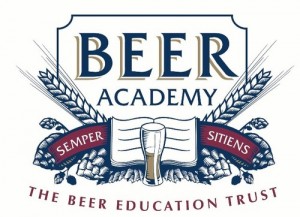 So, here’s my write-up of Day 1 of the Beer Academy “Advanced Course“, which is equivalent to the 1-day NVQ-Level-1 credited “Foundation Course“. The session I attended was conducted at The Bull in Highgate on 25/26 March 2014 and it is led by Derek Prentice – a Master Brewer who has been in the brewing industry for over 40 years. Starting out at Truman’s, and ending up at Fuller’s via Young’s. He has retired from Fuller’s now but has an eye out for picking up something in the burgeoning craft micro scene – with an ideal being a combined brewery, smokehouse, and bakery! Sounds wonderful to me. Without a doubt Derek is a lover of beer and extremely enthusiastic about all aspects of it – especially when talking about some of the finer details of ingredients and brewing. He is an engaging speaker with a bulk of knowledge that lets him riff on a point in a slide for minutes before realising we’d better catch up with our course schedule.
So, here’s my write-up of Day 1 of the Beer Academy “Advanced Course“, which is equivalent to the 1-day NVQ-Level-1 credited “Foundation Course“. The session I attended was conducted at The Bull in Highgate on 25/26 March 2014 and it is led by Derek Prentice – a Master Brewer who has been in the brewing industry for over 40 years. Starting out at Truman’s, and ending up at Fuller’s via Young’s. He has retired from Fuller’s now but has an eye out for picking up something in the burgeoning craft micro scene – with an ideal being a combined brewery, smokehouse, and bakery! Sounds wonderful to me. Without a doubt Derek is a lover of beer and extremely enthusiastic about all aspects of it – especially when talking about some of the finer details of ingredients and brewing. He is an engaging speaker with a bulk of knowledge that lets him riff on a point in a slide for minutes before realising we’d better catch up with our course schedule.
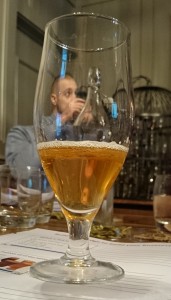 The “class” is made of up 15 “pupils” harking from a variety of backgrounds. Five from the beer/events industry, two with plans to go into the pub trade in Brighton, two with a brewery in Ireland, one setting up a brewery in Yorkshire, two “simply” working in bars, one professional brewer from Brazil looking for work in the UK, a chap there because the course was a birthday present, and me… whatever I am. That was a mouthfull. A very wide spread of knowledge levels represented here, which makes me wonder how the course can offer “something for everyone” to such a group.
The “class” is made of up 15 “pupils” harking from a variety of backgrounds. Five from the beer/events industry, two with plans to go into the pub trade in Brighton, two with a brewery in Ireland, one setting up a brewery in Yorkshire, two “simply” working in bars, one professional brewer from Brazil looking for work in the UK, a chap there because the course was a birthday present, and me… whatever I am. That was a mouthfull. A very wide spread of knowledge levels represented here, which makes me wonder how the course can offer “something for everyone” to such a group.
We are all given a printout of prepared slides that do not seem to have been prepared by Derek and on top of that his projector copy is ordered differently from our printed copy. I’m not one for following printed slides myself – but this did cause a bit of confusion and frantic page-flipping in the room. However Derek was clearly more than familiar with the content and led the show from his deck pretty fluidly regardless. Very good going given it was only his second time running the course.
The content is broken into modules that are interspersed with some beer tastings and beer and food pairings. From the slides alone the content doesn’t touch much that I’m not already familiar with but Derek makes up for this with the added value of his own experience and stories.
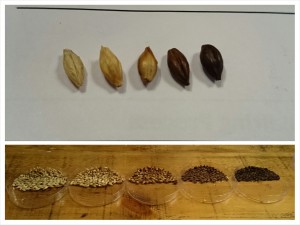 To begin we cover the basic ingredients of brewing. Water and its properties and adjustments. Barley, the malting process, and the varied flavour contributions of malted barley. Adjuncts and similarly their value in brewing and flavour. And finally hops – well covered for a complicated subject. Interesting bits of information about hop growing practices and history too… with morsels from Derek such as US growers not growing any male plants due to a dislike of seed production versus UK growers deliberately including males in order to result in seed production and thus cause the cones to close and reduce risk of mould issues. Climatic foibles! Derek also had a fun note to add about the yearly “Hop Shoot Day” where brewing folk gather and do something with the new season’s shoots… and that last year they tried a high alpha variety with little culinary success. Thus learning that hop bitterness properties affect the entire plant.
To begin we cover the basic ingredients of brewing. Water and its properties and adjustments. Barley, the malting process, and the varied flavour contributions of malted barley. Adjuncts and similarly their value in brewing and flavour. And finally hops – well covered for a complicated subject. Interesting bits of information about hop growing practices and history too… with morsels from Derek such as US growers not growing any male plants due to a dislike of seed production versus UK growers deliberately including males in order to result in seed production and thus cause the cones to close and reduce risk of mould issues. Climatic foibles! Derek also had a fun note to add about the yearly “Hop Shoot Day” where brewing folk gather and do something with the new season’s shoots… and that last year they tried a high alpha variety with little culinary success. Thus learning that hop bitterness properties affect the entire plant.
As is typical in these situations we were able to observe, feel, sniff, and even taste a variety of malts and hops.
This continued into the brewing process including yeasts… which is much what you’d expect if you’re familiar with brewing. Subjects cover backyard micros through to industrial level beer production. Various conditioning and packaging processes are covered – not in any way cask-centric either. Unlike experiences within CAMRA this course is all-inclusive… multinational brands lager brands are not shunned, or even despised – except where, perhaps, deserved. Objectivity is key however and cask also can go wrong and there are no kid-gloves for the cask industry.
From production we lead into history… which you could call “the usual suspects”. Beer versus ale, hops, barely touching on gruit, middle age brewing through to UK industrialisation and pale malts, and from there the spread of modern beer across the world.
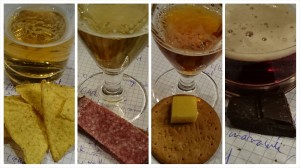 We’ve already started tasting beers at this point – beginning with Fraoch and then leading through a variety of common beers that usefully exhibit flavours like DMS, acetyl, and seriously bad skunk – the latter thanks to a good old UK regional brewery who love their clear glass. Grim. All up through the day we taste thirteen beers (not including the half I had in the bar with lunch). Some of the tasting forms a nice segue into the matter of beer and food matching. We try a few beers against selected morsels and discuss cut, complement, and contrast. I’d pull up an issue on the tasting here – beers were not treated as I’d have preferred. Too many were poured too well in advance. And bottle conditioned beers were poured through to dregs – leading to a variety of samples of the same beer being distributed, from crystal clear to near opaque. Some got a bright Duvel experiences whilst others basically got a “yeast shot”. This really could have been leveraged to the advantage of the course in fact. Derek did cover pouring etiquette with respect to yeast at the time. (Beer pouring was all handled by an off-sider.)
We’ve already started tasting beers at this point – beginning with Fraoch and then leading through a variety of common beers that usefully exhibit flavours like DMS, acetyl, and seriously bad skunk – the latter thanks to a good old UK regional brewery who love their clear glass. Grim. All up through the day we taste thirteen beers (not including the half I had in the bar with lunch). Some of the tasting forms a nice segue into the matter of beer and food matching. We try a few beers against selected morsels and discuss cut, complement, and contrast. I’d pull up an issue on the tasting here – beers were not treated as I’d have preferred. Too many were poured too well in advance. And bottle conditioned beers were poured through to dregs – leading to a variety of samples of the same beer being distributed, from crystal clear to near opaque. Some got a bright Duvel experiences whilst others basically got a “yeast shot”. This really could have been leveraged to the advantage of the course in fact. Derek did cover pouring etiquette with respect to yeast at the time. (Beer pouring was all handled by an off-sider.)
Quote time, regarding clear glass: “We tell them to bugger off, but they don’t believe you. Then you do a taste test and they *still* don’t believe you!” – Derek Prentice, Master Brewer.
From beer tasting and matching we lead on to fairly comprehensively, although speedily, cover core beer styles with respect to Europe but lacking an eye to the colonies. As much as I hate it a bit of an BJCP injection here would be educational… especially as it has increasing influence on local UK brewing, not just imports. Some history content comes in here of course and I learn a few things about the travel of brewing around Europe as a result.
The final part of the day deals with the on-trade – beginning with stats about the dire state of the overall market. Cask and keg are given equal treatment and matters of cooling, cellar management, glassware handling and selection, and staffing are all touched upon.
We wrap up with some more stats and an industry overview – with the upbeat message that beer is good and to go forth and evangelise our favourite drink.
To cap off the day we all complete a 20 question multiple choice paper, hand it in… and our certificates should be in the post. All very casual… and Derek makes the point that the course is intended to be an educational experience, not an assessment.
Day 1 completes the Beer Academy “Foundation Course”. Day 2 will apparently revisit the same areas but drill down to a greater level of detail (at the time of writing I’ve done Day 1 and am still do to Day 2 on the morrow). I’m looking forward to it… whilst Day 1 was fun it was far more confirmational than educational. There were few points of new data for me within the syllabus but this was more than made up for by Derek’s personal tales and input.
That said… I am, perhaps, a bit of an extreme beer nerd. I think the course would be extremely useful to people working in pubs. I came away from Day 1 thinking: if I ran a pub I’d get key staff to do this. It is accessible, not overly expensive, and leads to a sense of increased enthusiasm about beer… even for me. I’m feeling a little more refreshed and excited about beer already. Then again, that might be the beer talking…
I leave you with a Derek quote on the subject of sparklers: “Northern bloody things”… a sentiment with which I find myself agreeing… but I will continue to try and grok them in the name of personal education. I’m due a trip up north soon.
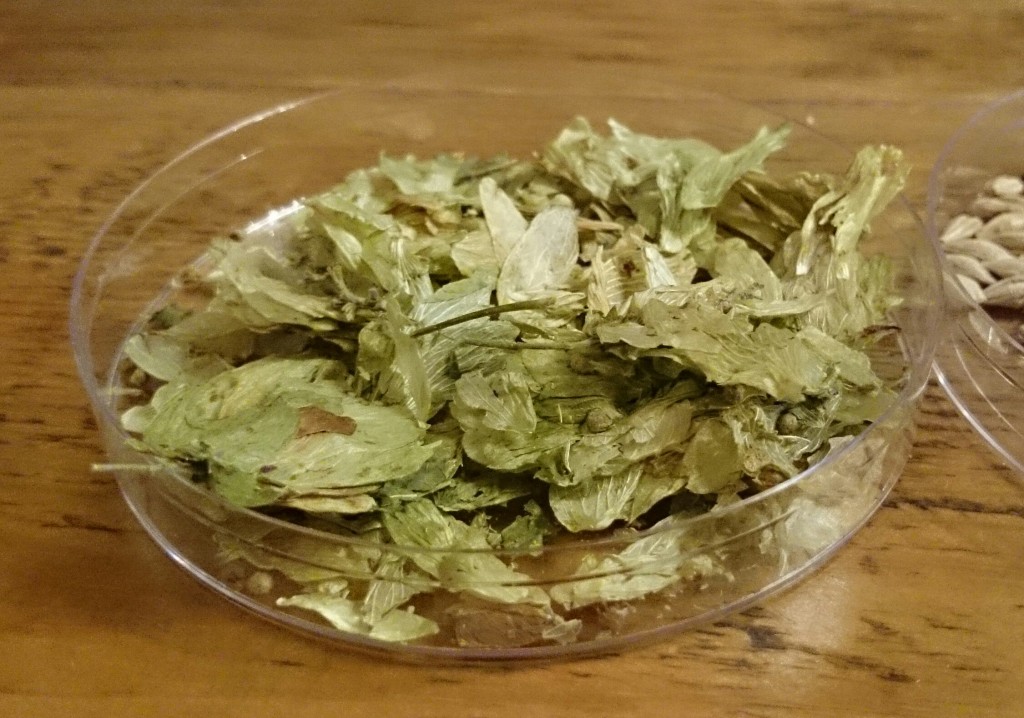
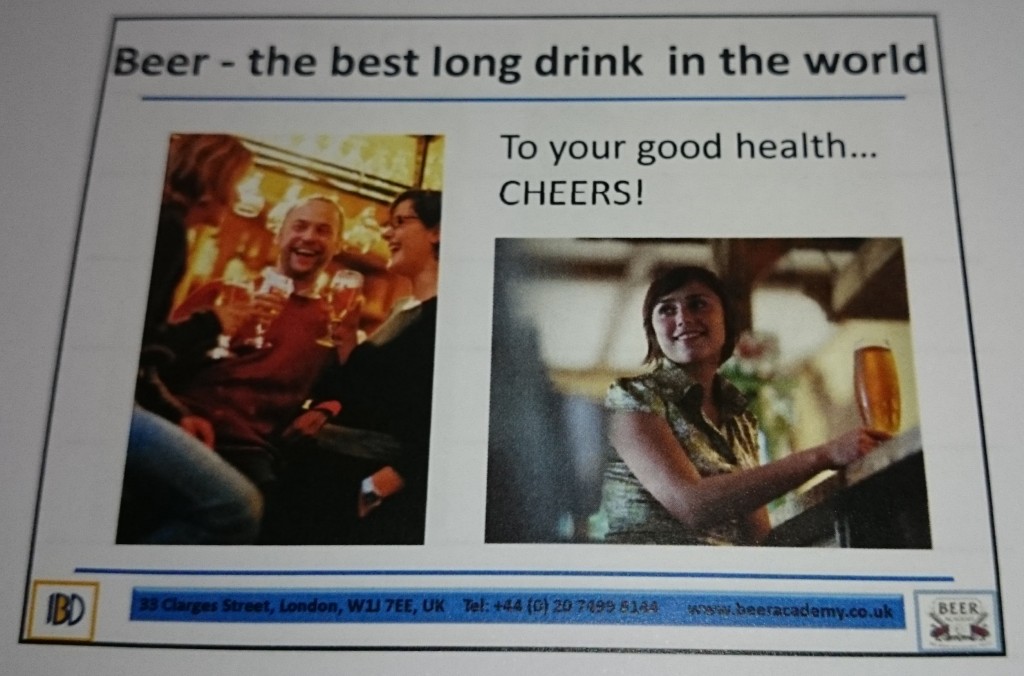
Great post, very informative for someone who would like to do this course but wasn’t sure what it might entail or cover before shelling out the money; wish I was lucky enough to get one as a birthday present like your fellow attendee!
Cheers – I’ve got Day 2 up now: http://ale.gd/blog/2014/03/beer-academy-advanced-course-day-2/
I think it is certainly worthwhile but the caveat as always is YMMV depending on your existing level of knowledge. Also Derek was fantastic, I wish I’d been able to pick his brains some more… I expect all the course leaders are similarly qualified but the experience is undoubtedly going to be different with different people.